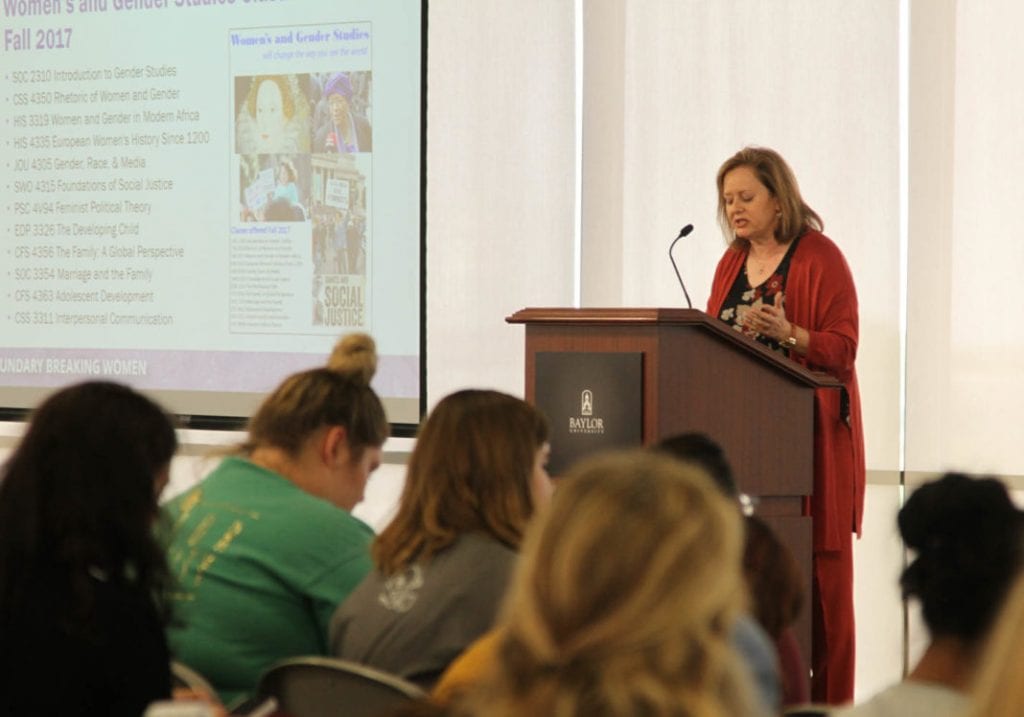By Courtney Doucet
Baylor’s Women’s and Gender Studies Program, despite being one of the lesser-known programs on campus, is raising awareness of women’s and gender issues by hosting events and discussing topics that students may find beneficial to their curriculum and their lives.
The program hosts two annual events, the Boundary Breaking Women panel discussion and an American Association of University Women’s-sponsored Start Smart Salary Negotiation workshop. Both events are typically held early in the fall.
“The program tries to encourage conversation about women and gender on our campus,” said Dr. Lisa Shaver, associate professor of English and director of gender studies.
When asked what she hopes Baylor students will learn from the program’s Boundary Breaking Women panel discussion, Shaver optimistically looks toward the changing future of gender issues.
“I hope that this will make them curious about other women that they are not aware of,” she said. “I hope it makes them question when they are reading or studying a subject, ‘Where are the women, or where are the individuals of color? What’s the full story here?,’ [and] appreciate when they do have that full story. I hope it will make them curious to question whether they are getting a full picture.”
The Boundary Breaking Women panel was launched in 2015 after the Gender Studies Program organized a discussion that addressed the U.S. Treasury’s decision to finally include a woman on American currency. The event was successful, and the program decided to continue with the panel for the following years.
 The theme of the 2018 Boundary Breaking Women panel was Redefining Womanhood, with 10 Baylor faculty members, including President Linda Livingstone, presenting the lives of lesser-known women in history. The hour-long panel highlighted the lives and accomplishments of past and current women such as activist and reformer Amelia Bloomer and modern Korean artist Nikki S. Lee.
The theme of the 2018 Boundary Breaking Women panel was Redefining Womanhood, with 10 Baylor faculty members, including President Linda Livingstone, presenting the lives of lesser-known women in history. The hour-long panel highlighted the lives and accomplishments of past and current women such as activist and reformer Amelia Bloomer and modern Korean artist Nikki S. Lee.
“We also help Baylor Career and Professional Development sponsor salary negotiation workshops for women, which include training and talks about the gender wage gap. These hopefully make students aware of the wage gap and learn ways they can help reduce that in their own careers,” said Shaver about the program’s Start Smart Salary Negotiation Workshop.
The salary workshop’s purpose is for college-aged women to learn skills that will help them negotiate salary rates once they enter the work field. According to the American Association of University Women’s (AAUW) research, women one year out of college are paid only 82 percent of what their male counterparts receive. This workshop provides tools and techniques that young women can use to combat this gender pay gap.
A Baylor chapter of the AAUW was chartered on campus in Spring 2018. The AAUW is a national nonpartisan, nonprofit organization. Its mission is to advance gender equity for women and girls through research, education and advocacy. The organization discusses topics such as sexual violence on campus and the significance of the Violence Against Women Act, among other relevant topics that affect women of today. The chapter was chartered with the hopes of organizing women to discuss gender issues.
Baylor’s Women’s and Gender Studies Program offers an interdisciplinary minor for students wishing take courses that are concentrated in gender studies across the arts, humanities and social sciences. There has been a gender studies minor at Baylor since 1996, but Shaver said it fell off of the radar of students and faculty over the years. In 2015, the curriculum and name of the minor were revamped and updated. Many professors on campus today are conducting research in women and gender issues, and the new courses offered in the minor reflect this research.
“There are courses from 12 different disciplines that look at a particular subject matter with a view of women on gender as a primary lens,” Shaver said.
Students looking to study gender can do so in a variety of Baylor departments with specialized focuses, including the English, history, journalism and philosophy departments. Courses range from “Rhetoric of Women and Gender” to “The History of Women in Latin America.” They are offered in the fall and spring semesters and are open to all students.
———————-
Photo courtesy of Baylee VerSteeg, Baylor Lariat


Such a great article. I will question, where are the women and where are the people of color. If none are mentioned then I now realize I may not be getting the full story. Thanks Courtney!